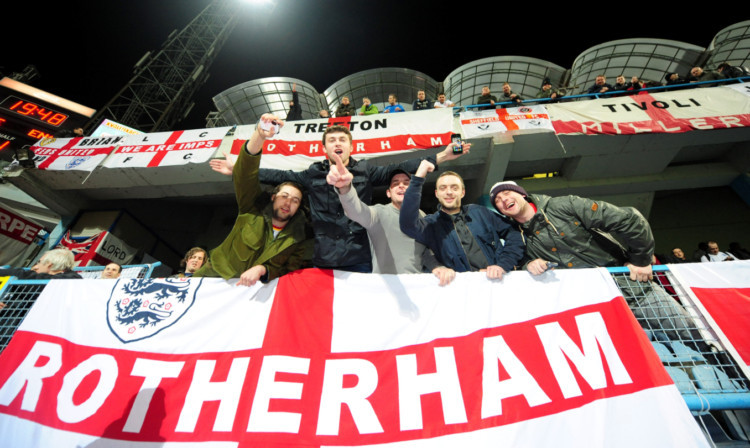
If you want to know why English football has a problem, take a look at the St George’s flags draped from the terraces of the Olympic Stadium in Kiev this evening.
Notts County and Millwall will be there. So, too, will Peterborough, Colchester, Rotherham and Oldham.
You might even see Hull City, though now they’re in the Premier League they may have bigger fish to fry.
What you won’t see are banners proclaiming allegiance to Arsenal, Manchester United, Chelsea, Liverpool, Manchester City and Tottenham Hotspur.
What happens to England no longer matters to fans of these clubs as long as Jack Wilshere doesn’t get injured again or Michael Carrick is fit to face Crystal Palace.
They don’t care if only 65 Englishmen started in the 10 Premier League fixtures prior to the international break, or that during the transfer window Spurs replaced seven players qualified to play for England with seven who were not.
They might moan when England under-perform but they’re not prepared to weaken their club side one iota to help them.
If the fans think this way, little wonder those Americans, Russians and Middle Eastern owners have no desire to help someone else’s national side.
Nor do those managers who know the only way to preserve their own jobs is to produce success today, not tomorrow.
And why would Premier League chief executive Richard Scudamore wish to see the most commercially successful league in the world reduced in quality by limiting its star attractions?
Last week, new FA chairman Greg Dyke gave his “state of the nation” address and issued a rallying call for everyone to forget self-interest and help create an England side that could win the World Cup in 2022.
He argued that a successful national team benefits everyone. Actually, he’s wrong.
It makes no difference to Manchester United’s Far East revenue stream and has no impact on the attendances at Old Trafford.
Arsenal will still rake in millions from season tickets and Anfield, Stamford Bridge, the Etihad Stadium and White Hart Lane will sell out every week.
The Premier League will continue to broker lucrative TV deals with countries who don’t know who Roy Hodgson is, let alone Mr Dyke.
And the idea that England reaching the semi-finals of Euro 2020 will have a knock-on effect on the fortunes of the U’s, Posh, Millers or Latics is frankly ludicrous.
The chief beneficiaries of a successful England are the FA’s commercial department, the shops that sell replica shirts and the supermarkets who stock their shelves with licensed merchandise.
If England miss out on qualifying for Brazil, they would be the real losers.

Enjoy the convenience of having The Sunday Post delivered as a digital ePaper straight to your smartphone, tablet or computer.
Subscribe for only £5.49 a month and enjoy all the benefits of the printed paper as a digital replica.
Subscribe